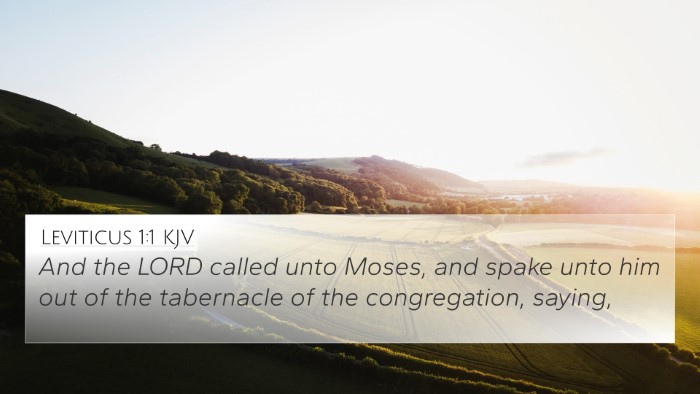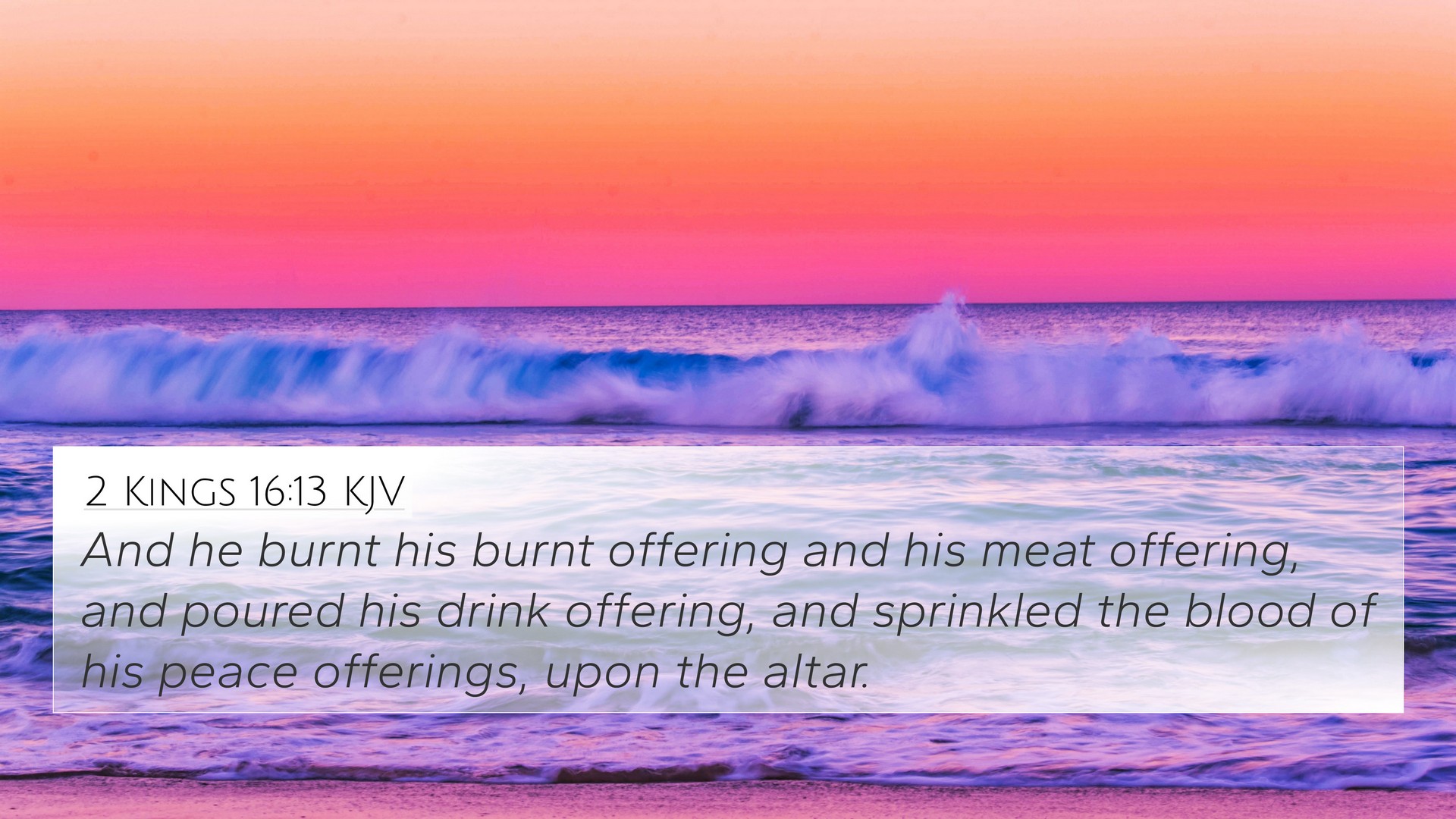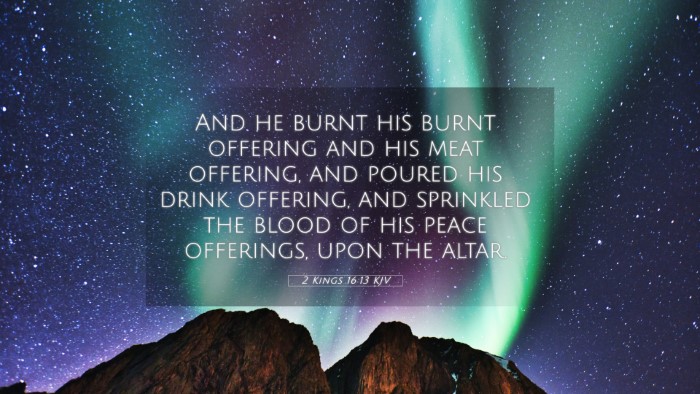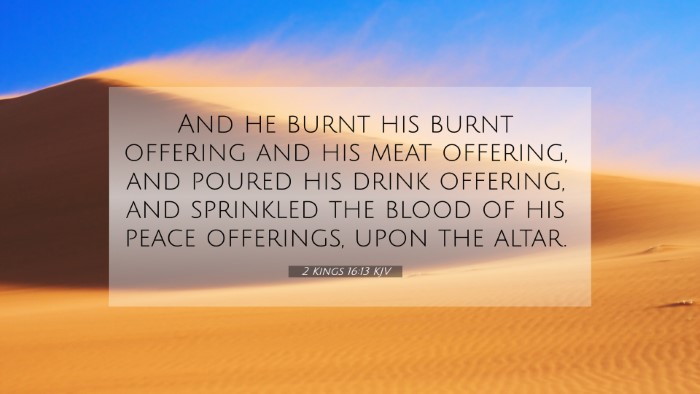Old Testament
Genesis Exodus Leviticus Numbers Deuteronomy Joshua Judges Ruth 1 Samuel 2 Samuel 1 Kings 2 Kings 1 Chronicles 2 Chronicles Ezra Nehemiah Esther Job Psalms Proverbs Ecclesiastes Song of Solomon Isaiah Jeremiah Lamentations Ezekiel Daniel Hosea Joel Amos Obadiah Jonah Micah Nahum Habakkuk Zephaniah Haggai Zechariah Malachi2 Kings 16:13 Similar Verses
2 Kings 16:13 Cross References
And he burnt his burnt offering and his meat offering, and poured his drink offering, and sprinkled the blood of his peace offerings, upon the altar.
Uncover the Rich Themes and Topics of This Bible Verse
Listed below are the Bible themes associated with 2 Kings 16:13. We invite you to explore each theme to gain deeper insights into the Scriptures.
2 Kings 16:13 Cross Reference Verses
This section features a detailed cross-reference designed to enrich your understanding of the Scriptures. Below, you will find carefully selected verses that echo the themes and teachings related to 2 Kings 16:13 KJV. Click on any image to explore detailed analyses of related Bible verses and uncover deeper theological insights.

Leviticus 1:1 (KJV) »
And the LORD called unto Moses, and spake unto him out of the tabernacle of the congregation, saying,
2 Kings 16:13 Verse Analysis and Similar Verses
Meaning and Interpretation of 2 Kings 16:13
Verse Context: 2 Kings 16:13 states, "And he sacrificed and burned incense in the high places and on the hills and under every green tree." This verse highlights King Ahaz’s actions, indicating his idolatrous practices and the consequences of deviating from worshiping Yahweh.
Key Themes in 2 Kings 16:13
- Idolatry: The sacrifices by Ahaz signal a key theme of idolatry that runs throughout Kings.
- Disobedience: Ahaz's actions represent a significant departure from God's commandments regarding worship.
- Consequence of Actions: His decisions affected the people of Judah and demonstrated a lack of faith.
- Symbolism of High Places: High places in scripture often symbolize unauthorized worship and the influence of pagan practices.
Interpretative Insights from Commentaries
This verse has been analyzed in various public domain commentaries providing additional perspectives:
Matthew Henry's Commentary
Matthew Henry emphasizes the significance of Ahaz's sacrifices in high places, indicating that such practices lead the people away from true worship. He notes that Ahaz’s disregard for God's commandments not only reflects personal disobedience but also sets a precedent for the nation, inviting divine disfavor.
Albert Barnes' Notes
Albert Barnes points out that Ahaz acted on his own authority, performing acts of worship that were explicitly forbidden in previous scriptures. He underscores the danger of adopting practices from neighboring pagan cultures, suggesting that this illustrates a broader theme of how foreign influences can corrupt spiritual integrity.
Adam Clarke's Commentary
Adam Clarke elaborates on the phrase "every green tree," explaining that such locations were considered places of idol worship. He provides a historical context, detailing that Ahaz's actions were politically motivated, aligning himself with Assyrian powers, hence forsaking his covenant with God, which had dire implications for Judah.
Bible Verse Cross-References
To understand the full implications of 2 Kings 16:13, it is valuable to consider cross-references that provide insight into similar themes of idolatry and disobedience:
- 2 Kings 17:10-12: Discusses the high places built by Israel and their practices of idolatry.
- Deuteronomy 12:2-4: Command from God regarding the destruction of high places to maintain true worship.
- Isaiah 7:9: Ahaz's lack of faith illustrated in his actions and the prophecy against him.
- Jeremiah 2:13: God condemns His people for abandoning Him, comparing Himself to a fountain of living waters.
- 1 Kings 12:28: Jeroboam’s establishment of high places which led Israel into sin mirrors Ahaz's actions.
- 2 Chronicles 28:24: More details on Ahaz's reign, focusing on his idolatrous practices.
- Micah 1:5: The consequences of sin and idolatry during the days of the kings.
Tools for Bible Cross-Referencing
To delve deeper into cross-referencing Biblical texts or understanding connections between Bible verses, consider these tools:
- Bible Concordance: Assists in locating verses based on specific words.
- Cross-Reference Bible Study: Guide for exploring interconnected themes across the scriptures.
- Bible Cross-Reference System: Organizational systems that facilitate verse connections, both thematic and narrative.
Conclusion: Inter-Biblical Dialogue
The study of 2 Kings 16:13 through the lenses of various commentaries and cross-referencing related texts provides a comprehensive understanding of its implications. Recognizing the connections enhances our grasp of the narrative's significance within the larger biblical context and encourages deeper engagement with scriptures.
For those interested in exploring how specific Bible verses relate to one another, utilizing a Bible cross-reference guide can enrich personal study and sermon preparation, aiding in uncovering the thematic structures within the scripture.


